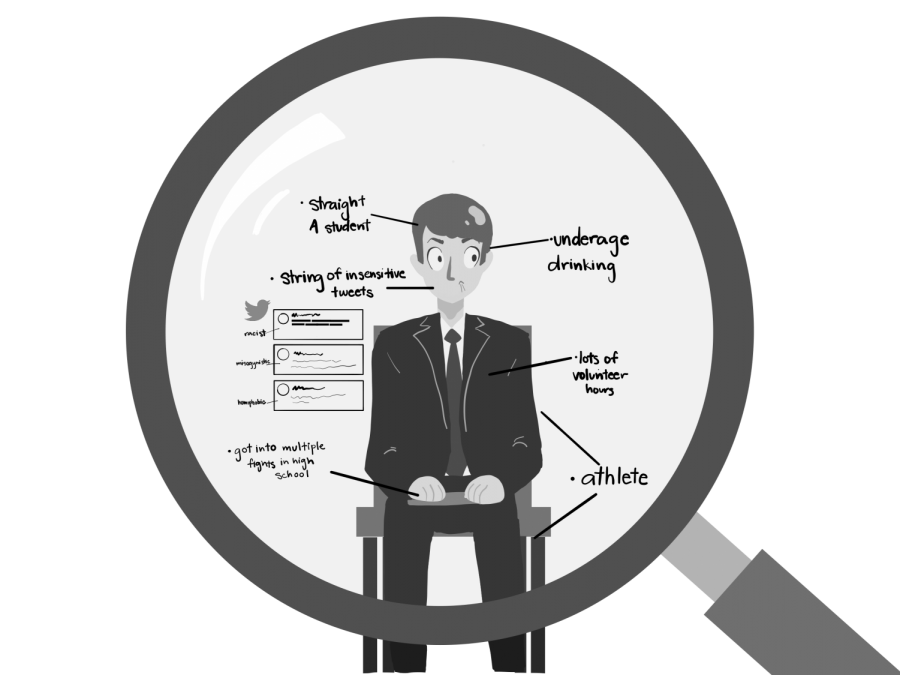Taking responsibility for our actions
October 17, 2018
As high school students, we’re constantly told that what we do now–every test, each interaction, each triumph or misstep– will impact our future. This seemingly-prophetic concept sometimes makes us view a less-than-ideal SAT score as a blemish on our lifelong resumes.
When put in perspective, though, the SAT– as with many things that consume us in high-school– will have little impact on our lives and the lives of others.
Yet, other actions we take as we step into adulthood can have a greater effect. We see the consequences of these choices everywhere, from job interviews to the U.S. Supreme Court.
After three women came forward in September to accuse Supreme Court Justice Brett Kavanaugh of sexual misconduct during his high school and college years, it sparked intense conversations about gender and privilege both within the Senate and across the country.
But these allegations also catalyzed another conversation. In the days before the trial, many contemplated a question with far-reaching implications. Kavanaugh had been a young adult at the time of the alleged assault in the early 1980s– so should the accusations, if true, affect the confirmation process in 2018?
The answer is clear. Harm, inflicted at any age and at any time, is just that– harm. While the allegations may have stemmed from the 80s, assault, harassment and bullying are all realities that students face today. And the effects haven’t changed, either– pain can stay with survivors, whether adults or teenagers, throughout their lives.
This conversation in our nation’s spotlight reflects an issue embedded in youth culture: the need for accountability.
With each passing high school year, we get closer to taking on larger responsibilities, both in our own lives and as citizens. Some of us are turning 18. We’re applying for jobs, or taking on internships. We’re living away from home, or learning how to drive. We’re preparing to vote, or perhaps casting our ballots already.
These are all actions for which adulthood holds us accountable–actions that cause harm should not be an exception. Some decisions may not seem permanent, but they can have a lasting impact on others.
Each choice we make molds us into the adults we ultimately become. Only by accepting responsibility for our decisions now, can we change ourselves for the better. And it’s through taking ownership of our behavior and its consequences that we earn others’ trust and respect.
While we are tasked with taking responsibility for our own decisions and actions, it’s critical that the institutions and people around us hold us to the same standard. For schools, this means being more transparent about issues, mistakes and consequences to allow everyone to learn. For students, this means speaking up when someone causes harm.
In less than a year, nearly one-fourth of our campus will embark on the next milestone in the journey of adulthood: college. With this expanded freedom, we won’t have our parents or our school to hold us responsible– and so we must take accountability ourselves. After all, we’re a sum of our actions. So let’s make those actions count.
better. And it’s through taking ownership of our behavior and its consequences that we earn the respect and trust of those around us.
While we are tasked with taking responsibility for our own decisions and actions, it’s critical that the institutions and people around us hold us to the same standard. For schools, this means being more transparent about issues, mistakes and consequences to allow everyone to learn. For students, this means speaking up when someone causes harm.
In less than a year, nearly one-fourth of our campus will embark on the next milestone in the journey of adulthood: college. With this expanded freedom, we won’t have our parents or our school to hold us responsible for our mistakes– and so we must take accountability ourselves. After all, we’re a sum of our actions. So let’s make those actions count.
This piece was originally published in the pages of The Winged Post on Oct. 17, 2018.


















![“[Building nerf blasters] became this outlet of creativity for me that hasn't been matched by anything else. The process [of] making a build complete to your desire is such a painstakingly difficult process, but I've had to learn from [the skills needed from] soldering to proper painting. There's so many different options for everything, if you think about it, it exists. The best part is [that] if it doesn't exist, you can build it yourself," Ishaan Parate said.](https://harkeraquila.com/wp-content/uploads/2022/08/DSC_8149-900x604.jpg)




![“When I came into high school, I was ready to be a follower. But DECA was a game changer for me. It helped me overcome my fear of public speaking, and it's played such a major role in who I've become today. To be able to successfully lead a chapter of 150 students, an officer team and be one of the upperclassmen I once really admired is something I'm [really] proud of,” Anvitha Tummala ('21) said.](https://harkeraquila.com/wp-content/uploads/2021/07/Screen-Shot-2021-07-25-at-9.50.05-AM-900x594.png)







![“I think getting up in the morning and having a sense of purpose [is exciting]. I think without a certain amount of drive, life is kind of obsolete and mundane, and I think having that every single day is what makes each day unique and kind of makes life exciting,” Neymika Jain (12) said.](https://harkeraquila.com/wp-content/uploads/2017/06/Screen-Shot-2017-06-03-at-4.54.16-PM.png)








![“My slogan is ‘slow feet, don’t eat, and I’m hungry.’ You need to run fast to get where you are–you aren't going to get those championships if you aren't fast,” Angel Cervantes (12) said. “I want to do well in school on my tests and in track and win championships for my team. I live by that, [and] I can do that anywhere: in the classroom or on the field.”](https://harkeraquila.com/wp-content/uploads/2018/06/DSC5146-900x601.jpg)
![“[Volleyball has] taught me how to fall correctly, and another thing it taught is that you don’t have to be the best at something to be good at it. If you just hit the ball in a smart way, then it still scores points and you’re good at it. You could be a background player and still make a much bigger impact on the team than you would think,” Anya Gert (’20) said.](https://harkeraquila.com/wp-content/uploads/2020/06/AnnaGert_JinTuan_HoHPhotoEdited-600x900.jpeg)

![“I'm not nearly there yet, but [my confidence has] definitely been getting better since I was pretty shy and timid coming into Harker my freshman year. I know that there's a lot of people that are really confident in what they do, and I really admire them. Everyone's so driven and that has really pushed me to kind of try to find my own place in high school and be more confident,” Alyssa Huang (’20) said.](https://harkeraquila.com/wp-content/uploads/2020/06/AlyssaHuang_EmilyChen_HoHPhoto-900x749.jpeg)







